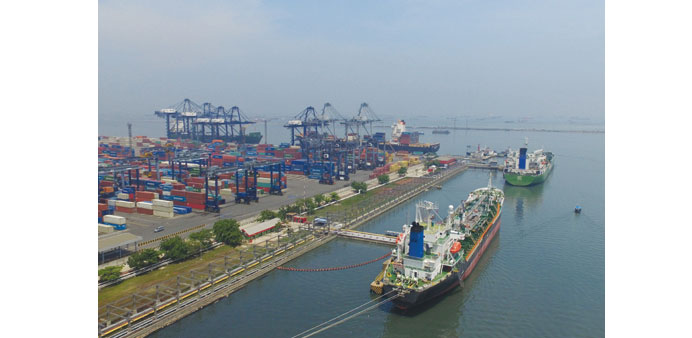Oil tankers are docked at a PT Pertamina facility at Tanjung Priok Port in Jakarta. Saudi Arabia is currently taking part in an open tender by Pertamina for the development of a greenfield refinery project in East Java.
By Arno Maierbrugger
Gulf Times Correspondent
Bangkok
As Indonesia re-joined the Organisation of Petroleum Exporting Countries (Opec) this month, the nation continues to lure foreign investors for its oil and gas industry, particularly from the Middle East where Saudi Arabia and Iran are currently showing most of the interest. However, not just oil and gas are on the table, but also investments into other energy sectors such as coal and geothermal, as well as in power plants and energy infrastructure.
Saudi Arabia, top Opec producer and a country which defines Opec policies to a large extent, has already announced its plans to invest in Indonesia and is currently taking part in an open tender held by Indonesia’s state-owned oil and gas company Pertamina for the development of a greenfield refinery project in East Java.
The bidding started after another deal between Saudi Aramco and Pertamina was closed to jointly upgrade the capacity of the country’s existing, largest refinery in Central Java with an estimated investment of $5.5bn. This collaboration would also include an agreement that would enable Saudi Aramco to export its crude oil to the refinery. In the refinery projects, the Saudis ousted Kuwait after Indonesia broke off talks over building two refineries with Kuwait Petroleum as a partner in 2014 due to a disagreement over taxes and fiscal terms.
Iran, in turn, is also interested in setting up joint ventures with private national firms to build refinery capacity, but Indonesia wants to offer investors more wide-ranging cooperation in the electricity sector. According to Energy and Mineral Resources Minister Sudirman Said, discussions could start “as soon as the international sanctions are being lifted from Iran.”
Another player in the Indonesian hydrocarbon and energy market could be Qatar. As reported by Gulf Times on December 8, Indonesia’s ambassador to Qatar, Deddy Saiful Hadi, invited companies like Qatar Petroleum or RasGas to explore and develop potential oil or natural gas fields under a production contract sharing scheme.
In any case, it makes sense for Opec members to invest in Indonesia from a long-term perspective. The country’s demand for energy is growing fast as its economy is in a sustainable upswing and an expanding industry and growing middle class are getting increasingly power-hungry. Indonesia’s oil demand is now 1.6mn barrels per day while only around half of that is produced domestically. Adding to that, refinery developments have been delayed in the past because they were considered unprofitable and foreign oil and gas firms have been hesitant to invest in the country, deterred by an uncertain business environment, lack of legal certainty, too much bureaucracy and embezzlement scandals involving senior energy officials. As a result of falling domestic production, Indonesia was forced to turn to expensive imports of oil and petroleum products to meet domestic demand which makes it now, ironically, the only Opec member being happy about low oil prices.
But the current government of President Joko Widodo is working hard to revive the ailing energy sector which still suffers from mismanagement and corruption. In the largest step to get things going, Indonesia will now offer 21 oil and gas blocks through an open tender in 2016.
However, it is important to note that investors in Indonesia’s energy sector also need to be ready to take certain risks they might not face elsewhere. At times, oil exploration and other energy projects in parts of Indonesia can be very challenging due to extreme topography and inadequate supporting infrastructure, which normally requires more investment and time to finalise individual projects.

